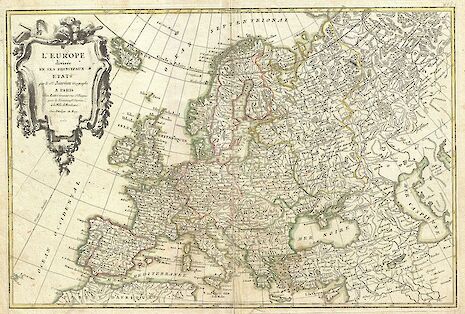Word Up: Five words whose meanings have completely changed
In this week’s column, Georgie Thorpe considers how the meaning of a word can become its exact opposite.

I’m sure some of you will have heard the complaint being made (probably by someone of an older generation) that using ‘sick’ to describe something good just doesn’t make any sense. And at face value, it really doesn't. Why would a word defined as ‘affected by physical or mental illness’ mean ‘cool’?
Words changing meaning in this way is actually a very common phenomenon, and not unique to current slang words. The idea of language being a living thing might be hackneyed, but it’s essentially true; a language’s ability to develop and change is what prevents it from becoming extinct or falling out of use. This means that, over time, words can come to mean even the exact opposite of what they once meant, and there are a lot of words in our vocabulary today that have done just that.
“A language’s ability to develop and change is what prevents it from becoming extinct or falling out of use”
‘Bully’, for example, originally meant a sweetheart of either gender, and later came to mean 'a fine fellow'. It comes from a Dutch word, ‘boel’, which meant ‘lover’. It wasn’t until the late 17th century that it took on the meaning it has today. The process of change came from the idea that a dandy gentleman might also be rather blustery and overpowering, capable of picking on people with a weaker personality, which then developed into the notion of a bully. In North American slang, some of the old meaning is still retained, especially in the phrase ‘bully for you’, meaning ‘good for you’.

Another word that has drastically changed meaning is ‘nervous’, which used to mean vigorous, originating from the Latin word for sinewy, ‘nervosus’. It came to mean ‘of the nerves’, a meaning it still has today, in the 1660s, which makes it seem strange that its modern meaning is to do with lacking nerve or courage. This probably comes from its eighteenth century sense, which was linked with disorders of the nervous system, and so began to be associated with weakness or infirmity. Though our modern meaning has moved away from any medical connotations, we can see how this might have led to today’s definitions of anxiety and fear.
Peculiarly, the word ‘sad’ used to mean steadfast, firm, or full (of food and drink). It comes from the Old English ‘sæd’ which means ‘sated’, and is linked to German words like ‘satt’, which still means full today. Over the course of time, the idea of being full changed into the idea of being too full, or fed up of something, and in the 14th century it finally came to mean unhappy, as we use it today. It wasn’t until 1899, however, that it developed the slang meaning of being pathetic, quite distant from its originally meaning of being fixed or tough.
“The word ‘sad’ used to mean steadfast, firm, or full”
Perhaps more concerning is the change that the word ‘egregious’ has undergone. These days, it’s defined as meaning ‘outstandingly bad or shocking’, but it didn’t always mean that; it used to mean outstandingly good. It comes from a Latin phrase, ‘ex grege’, which means ‘out of the herd’, and had a positive sense of standing out from others. It’s not really clear how or when this word came to mean specifically something bad, but one suggestion is that it happened due to changing attitudes to uniqueness. Over time, standing out from the crowd came to be a bad thing, especially with the rise of consumerism and a culture of advertisement that relies on being able to pigeonhole people. It was no longer good to be ‘ex grege’, but distinctly frowned upon, and according to this theory it was this change that led to the meaning reversing in this way.
There are even some words that have maintained their double meanings in dialect into the modern day. My mum, who grew up in the north of England, can still confuse me and my dad by announcing ‘I doubt it'll rain’ and then warning us to take umbrellas. To her, ‘I doubt it’ll rain’ means ‘I think it will rain’, and she can’t explain the difference between that and cases in which ‘doubt’ really does mean ‘doubt’. This meaning used to be common, and crops up in a lot of literature from the 17th through to the late 19th century. It probably arises from the original meaning of ‘doubt’, which was ‘be doubtful’ or ‘be afraid’; when my mum says ‘I doubt it’ll rain’, she means ‘I’m afraid it’ll rain’, but this meaning has largely been lost in other English dialects.
So next time millennials are accused of butchering and distorting the English language, rest assured; it’s a centuries-old phenomenon that’s actually key to the development and survival of the language. And who knows what English will look like in 100 years when even more of these changes have happened?
 News / Colleges charge different rents for the same Castle Street accommodation2 March 2026
News / Colleges charge different rents for the same Castle Street accommodation2 March 2026 News / News in Brief: waterworks, wine woes, and workplace wins 1 March 2026
News / News in Brief: waterworks, wine woes, and workplace wins 1 March 2026 News / Climate activists protest for ‘ethical careers policy’1 March 2026
News / Climate activists protest for ‘ethical careers policy’1 March 2026 News / Angela Merkel among Cambridge honorary degree nominees27 February 2026
News / Angela Merkel among Cambridge honorary degree nominees27 February 2026 News / Private school teacher who lied about Cambridge degree barred from teaching27 February 2026
News / Private school teacher who lied about Cambridge degree barred from teaching27 February 2026








